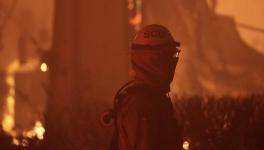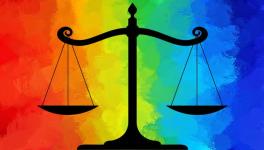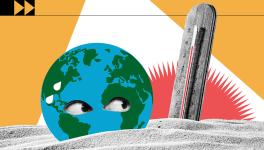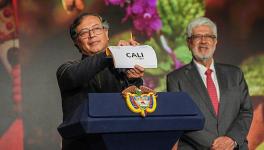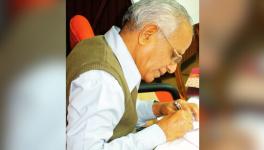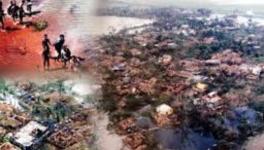Power of Poetry to Move us to Love in Times of Human Cruelty
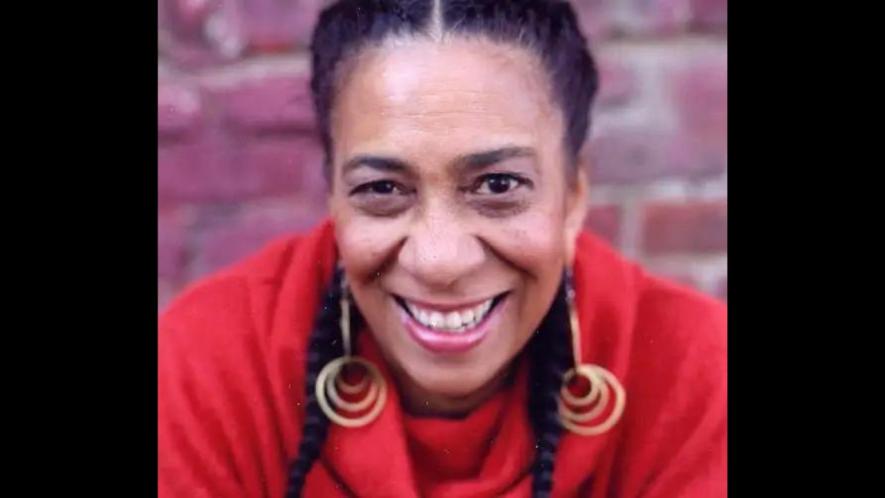
Devorah Major. (image courtesy: devorahmajor.com)
Near the end of November 2023, about 15,000 people—including at least 5,500 children—had been killed by Israeli military bombardment in less than two months. Israel’s near-constant bombing and artillery fire in the 25-mile Gaza Strip began following an attack by Hamas that reportedly killed several hundred Israeli civilians.
For weeks, Israel cut off access to water, electricity, internet, and basic supplies in Gaza. International aid groups were barred from helping wounded and stranded civilians—civilians largely unable to flee Gaza since it is surrounded by walls and the Israeli military in the fashion of an open-air prison.
Many international aid organisations have called Israel’s illegal occupation of the Gaza Strip and West Bank, and its treatment of Palestinian civilians, an apartheid for decades. In this current conflict, aid groups have warned of unprecedented humanitarian crises. On November 16, UN experts wrote, “Grave violations committed by Israel against Palestinians in the aftermath of October 7, particularly in Gaza, point to a genocide in the making.”
Amid global concerns of genocide being committed against civilians in Gaza, continual mass public protests have taken place around the world following October 7, often led by Jewish people.
Protests have called Israel’s actions a genocide and have highlighted the humanitarian crisis unfolding in Gaza, citing multiple statements by state officials, the unparalleled number of civilian lives lost—so many of whom were children, and other reported international war crimes on the part of Israel (including attacks on hospitals, and the use of white phosphorus chemical bombs).
In mid-November, more than 2,000 musicians had urged Israel to declare a ceasefire in Gaza, and 24 US Congress members had signed onto a letter asking US President Joe Biden to call for a ceasefire. On November 16, the Los Angeles Times editorial board publicly called for a ceasefire in Gaza, joining the increasing global demand for an end to the violence.
On November 24, a four-day truce was reached between Israel and Hamas, which included “the release of Hamas captives and Palestinian prisoners.” This agreement was extended by two days on November 27. Protests continued during the truce, as activists in New York shut down the Manhattan Bridge on November 26 and disrupted the Macy’s Thanksgiving Day Parade, pointing out that a humanitarian pause is not the same as a long-term ceasefire.
Political Poetry
Meanwhile, since the beginning of November 2023, multiple reports stated entire families, with members spanning three or four generations, had been killed by the Israeli military in Gaza. As of late November, an unknown number of nameless and unidentifiable bodies lay in piles in Gaza, including thousands of children.
Among the most tragic images from the Gaza Strip during these weeks on social media were those of children’s names written on their bodies, in hopes that they would be identifiable if killed. After learning about the practice in a social media post, San Francisco’s third poet laureate, Devorah Major, wrote the following poem:
Childhoods remembered
do you remember holding
your small child hand up to
your father’s large comforting hand
amazed at its size compared
to your vine thin fingers?
do you remember making
fingers and palms into church and steeple
and then opening to see all the people?
do you remember drawing
eyes and mouths on fingers
creating silly finger people?
thumb folded around
pointer finger making a mouth
opening and closing—
silly games of childhood
laughter crawling down our bodies
dissolving in the air
and reappearing
as a tickle giggle
finger wiggle.
remember?
not wanting to be one of the missing
or one of the unable to be identified killed
the little girl wrote on the inside of her
heart shaped palm between heart
and lifelines in neat Arabic script
“if my hand survived
this is my name” before she was slain.
these children do not have
numbers burned into their arms
but many have written their own
names statements and identification numbers.
pants legs rolled up reveal
the brothers inscribed legs reading
Ahmad Nateel
Jowan Nateel
Rebhan Nateel.
did the oldest write it for his younger brothers
or were they perhaps written by a trembling mother
or a father writing while damming his own tears?
now they lie next to each other
softly browned saplings chopped down
before they could bear fruit.
the whole family it seems
assassinated in what their killers
call a cleansing
a mowing of grass
a righteous final solution
are you old enough to remember being a child
old enough to remember growing up
maybe even remember becoming old
they are not
their dead bodies
reflect the memories they will never have
one child has written on her arm
“no I will not die”
does she still live
Poet Devorah Major has also written the poem “land, settlers, and genocide: america, australia, palestine” and others in response to “the most recent October 2023 Israeli attacks on and siege of Palestine,” she says. She notes that Israel’s current military response in Gaza is, “…precipitated by the October 7 Hamas attack on Israel, which was precipitated by the continued aggression, murders, and land grabbing by Israel back to 1948.”
Major is a California-born, “granddaughter of immigrants, documented and undocumented,” award-winning poet, and writer of both prose and fiction who taught poetry craft, science fiction, short story writing, and composition at California College of the Arts (and has taught at a number of universities and other higher education institutions as well). She has been part of the poetry performance group Daughters of Yam for more than 20 years, and is a Cave Canem poetry fellow. Growing up, she says, poetry and books were “everywhere around” her home. Her father was a (nonfiction) writer and befriended poet Bob Kaufman in San Francisco’s North Beach when she was young, and her father would sometimes recite lines from Kaufman’s poetry book Golden Sardine to her. She wrote her first poem around the age of seven or eight, about a turtle.
She says the reasons she began writing poetry as “an avocation, vocation, and passion” is another story. This story is rooted in the Black Arts Movement, which had come to be by the time she was a teen. While studying dance and theater she found herself writing more and more poetry.
“A lot of us did,” she says, sharing that poet Sonia Sanchez was also a friend of her father’s. “I remember finding her chapbook, Homecoming, lying on our dining room table. The Last Poets were playing on the radio and poetry seemed to be the lingo of the times. It spoke to the promise of a revolutionary change that would bring the world I saw in my dreams to a world I lived in. It was wonderful and I was hooked.”
In an interview with the Independent Media Institute, she shared about her poetic process, why she writes poetry that is political, and the power of poetry to help us find connection and understanding as we navigate all the facets of this world, including unfathomable human cruelty.
April M. Short: What continues to draw you to poetry as an art form, especially in times of upheaval, violence, and conflict?
Devorah Major: Writing poetry is, for me, a way to see things more clearly, to question what surrounds me, to seek or express a kind of spirituality, to heal and be healed, to learn. I find words quite powerful. Wars are waged with weapons, but peace is attained through words.
In these times where there is so much dishonesty in the media and even much more distraction from what is really going on in our world, poetry can be a kind of light that helps us consider or reconsider where and how we stand in the world. Ultimately, I am not sure human cruelty and acts of genocide can ever be really understood, but poetry can help us see it more clearly and define better ways to vanquish it, ways to be truly human, to be more humane. Poetry is a means of connection.
When I have had the privilege of sharing my work in an international poetry festival, what was most inspiring and encouraging for me was that each of us, hailing from far parts of the globe and speaking myriad languages shared the same visions for a world that thrived on unity and cooperation and, of course, love—and turned from war and oppression, not just through words but through action.
AMS: Is there something unique that poetry can offer in coming to terms with difficult and painful realities in the world?
DM: I think that poetry can, in a concise and moving way, provide historical context, which often provides strategies for successful struggle and timely reflections on the happenings of the times. This helps people to emotionally and spiritually engage with these realities instead of just viewing news bites.
At its best, poetry can say in a very few words what an entire essay might discuss. Before we can solve a problem, we must clearly see its parameters. Poetry helps one to see. It is, after all, one thing to look, and quite another to see.
AMS: Will you please share why and when you wrote “childhoods remembered,” and your personal process with this piece?
DM: My daughter sent me a social media video of living and dead children with names written on their arms and legs. When I finished crying, I realized I had to write a poem that considered what this horrific act of writing on one’s body so that one’s corpse could be identified meant.
I remembered teaching my toddler daughter hand games that I had played as a child. That was the poem’s doorway for me. That poem poured out of me. Sadly, the translation did not name the girl who wrote, “No, I will not die,” or I would have included her name in the poem, too.
AMS: Will you please share your process and reasons for writing “land, settlers, and genocide: america, australia, palestine”? What were you thinking and what compelled you to tell this story in this way?
DM: What struck me about this barbaric response to the Hamas action, which insofar as it killed civilians also was barbaric, was that the occupation of Indigenous people’s land had a long, brutal history. I focused on North America, Australia, and Palestine. I actually researched what trees grew in America and Australia when they were uncolonized land and what crops were grown and harvested in Palestine for centuries.
Did you know Israelis uprooted olive trees that were over 2,000 years old to plant their pine trees? While looking into that, I found out that some olive trees chopped down and planted over with the Israeli pines began to regrow after 50 years dormant, and split open the pine trees. I often do some research for this kind of poem to make sure I stay focused on yes, the emotions, the story, the moments, but also the actual history and ecology that can provide useful metaphors.
AMS: Some Americans (and others) have been afraid of speaking up against Israel’s actions and/or are inundated with media narratives in support of Israel. Have you experienced backlash in regard to these poems and/or your work in general? If so, how do you navigate that?
DM: Some Americans fear their shadow. Most do not see the full picture and have no sense of history or context. American media contributes to this ignorance because of its own imperatives that rest on supporting the capitalist, war economy and sustaining the current power structure.
My fear is the world the children, all the children, will inherit if I am complicitly helping in this destruction with silence. Thus far, however, the comments I have gotten about my poems have all been supportive.
AMS: Have you ever felt hesitant to share poetry that is political, and where do you source the courage to create and share your art and your voice?
DM: I consider all art, and thus all poetry, political. The choice of focus, the choice of point of view, the choice of subject are all political choices. Does one look at the sky and only note its colors and the way they make one feel in that moment and maybe planes seen swooping by? Or does one notice how its colors have turned because of pollution, and the planes are warplanes leaving trails between the clouds? Does one write of idyllic, mythic love or investigate love’s truths? Do the words seek to distract or engage? Do I speak for positive change and the empowerment, freedom, and uplifting of the people, or do I write words that support, sustain, and possibly glorify the rulers and the military-industrial complex that is quite international these days and times? For me, even if I am writing a poem about the stars or the sea, the way I address that subject is innately political while I strive to maintain its scientific and poetic integrity.
I don’t find it an act of courage to speak truth as I see it. It takes no more courage to write on human struggles in these times than it does when I write of love or of the universe. However, at times, it does take a measure of courage to look, to actually see, especially now when the planet is burning in so many ways—Palestine, Sudan, Ukraine, American city streets, among the many formal and informal wars; and of course, the planet itself is suffering its own warming and fires due to human excesses. I am never hesitant to share my voice. I simply keep working to improve my craft and my clarity, hoping that some of my words land in other people’s ears and/or hearts and are found of value.
April M. Short is an editor, journalist, and documentary editor and producer. She is a co-founder of the Observatory, where she is the Local Peace Economy editor, and she is a writing fellow at the Independent Media Institute. Previously, she was a managing editor at AlterNet as well as an award-winning senior staff writer for Good Times, a weekly newspaper in Santa Cruz, California.
This article was produced by Local Peace Economy, a project of the Independent Media Institute.
Get the latest reports & analysis with people's perspective on Protests, movements & deep analytical videos, discussions of the current affairs in your Telegram app. Subscribe to NewsClick's Telegram channel & get Real-Time updates on stories, as they get published on our website.









